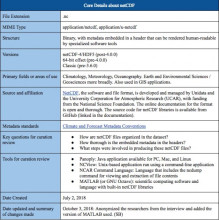susan borda
Posts tagged with Data in Blog Bits and Pieces
Showing 11 - 15 of 15 items

In the UMich Research Data Services (RDS) group, we see and work with all sorts of data. One particularly thorny variety is netCDF. In Deep Blue Data, we have been getting regular deposits of data in this format, and we didn't know much about it. We had many questions how do we open it, what's its structure, how do researchers create these files and why can the size vary so widely from 100s of MBs to 100s of GBs or even TBs? Jake Carlson, Director of RDS, and I hashed out the idea of creating "profiles" for file formats as quick reference resources for RDS as well as others in the data curation field to help us do our jobs more easily and consistently. So, we thought we'd pilot this idea by creating a “Data Curation Format Profile” (DCFP) for netCDF data files since it seemed like an interesting file format and we were likely to get more of them in the future.

This past week, the University of Michigan Library was pleased to host the second annual Midwest Data Librarian Symposium (MDLS). The goal of the symposium was to offer librarians who work with research data in the midwest a chance to network and discuss issues in their fields.

It is common scholarly practice to publish results of research, and it is becoming increasingly more important to share the underlying data. Data sharing allows for the replicability and verification of experimental findings and allow for reuse in new and unexpected ways. Sharing your data may also increase the impact of your research.

The Oxford English Dictionary defines organized as: “Of a person: having one's affairs in order so as to be able to deal with them efficiently.”
When you spend the best hours of your day doing research and working with data, it makes sense to be organized so you can use your time as efficiently as possible. One of the methods for maintaining an organized research life is by developing a data management plan (DMP).
When you spend the best hours of your day doing research and working with data, it makes sense to be organized so you can use your time as efficiently as possible. One of the methods for maintaining an organized research life is by developing a data management plan (DMP).

Welcome to our series of Love Your Data Week posts! Each day this week, in connection with the Love Your Data campaign on social media, a UM librarian will be blogging about a different data-related topic, sharing personal anecdotes and tips that you can use to improve your own research data practices. To kick things off, we're writing today about data safety.